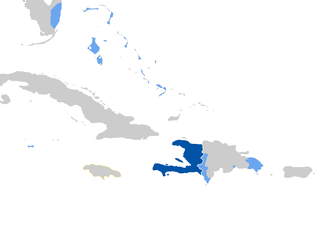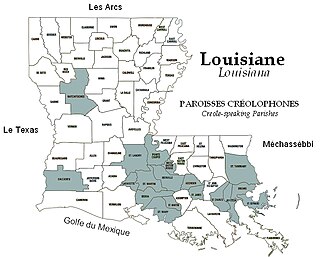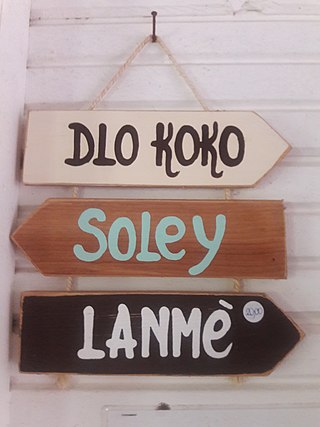
Haiti is the 83rd most populous country in the world, with an estimated population of 11,123,178 as of July 2018. The last national census in Haiti was done in 2003. Although much of that data has not been released, the population recorded was 8,812,245.

The politics of Haiti takes place in the framework of a unitary semi-presidential republic, where the president is the head of state and the prime minister is the head of government. The politics of Haiti are considered historically unstable due to various coups d'état, regime changes, military juntas and internal conflicts. After Jean-Bertrand Aristide was deposed, Haitian politics became relatively stable. The Economist Intelligence Unit rated Haiti an "authoritarian regime" in 2022. According to the V-Dem Democracy indices Haiti is 2023 the 4th least electoral democratic country in Latin America.

The Greater Antilles is a grouping of the larger islands in the Caribbean Sea, including Cuba, Hispaniola, Puerto Rico, and Jamaica, together with Navassa Island and the Cayman Islands. Seven island states share the region of the Greater Antilles, with Haiti and the Dominican Republic sharing the island of Hispaniola. Together with the Lesser Antilles, they make up the Antilles, which along with the Lucayan Archipelago, form the West Indies in the Caribbean region of the Americas.

Haitian Creole, or simply Creole, is a French-based creole language spoken by 10 to 12 million people worldwide, and is one of the two official languages of Haiti, where it is the native language of the vast majority of the population. Northern, Central, and Southern dialects are the three main dialects of Haitian Creole. The Northern dialect is predominantly spoken in Cap-Haïtien, Central is spoken in Port-au-Prince, and Southern in the Cayes area.
The culture of Haiti is a creolized blend of African, European and Taino elements due to the French colonization of Amerindian land, in conjunction with the large diverse enslaved African population who had later freed themselves by a successful revolt. These attributions have largely influenced the art, cuisine, literature, music, religion as well as the languages of Haiti.

French America, sometimes called Franco-America, in contrast to Anglo-America, is the French-speaking community of people and their diaspora, notably those tracing back origins to New France, the early French colonization of the Americas. The Canadian province of Quebec is the centre of the community and is the point of origin of most of French America. It also includes communities in all provinces of Canada, Saint Pierre and Miquelon, Saint Martin, Saint Barthélemy, Martinique, Guadeloupe, Saint Lucia and Haiti in the Caribbean; French Guiana in South America. Also there are minorities of French speakers in part of the United States, the Dominican Republic, Dominica, Grenada and Trinidad and Tobago.
French Creole may refer to:

Louisiana Creole is a French-based creole language spoken by fewer than 10,000 people, mostly in the U.S. state of Louisiana. Also known as Kouri-Vini, it is spoken today by people who may racially identify as white, black, mixed, and Native American, as well as Cajun and Creole. It should not be confused with its sister language, Louisiana French, a dialect of the French language. Many Louisiana Creoles do not speak the Louisiana Creole language and may instead use French or English as their everyday languages.

Antillean Creole is a French-based creole that is primarily spoken in the Lesser Antilles. Its grammar and vocabulary include elements of French, Carib, English, and African languages.

A French creole, or French-based creole language, is a creole for which French is the lexifier. Most often this lexifier is not modern French but rather a 17th- or 18th-century koiné of French from Paris, the French Atlantic harbors, and the nascent French colonies. This article also contains information on French pidgin languages, contact languages that lack native speakers.

Louisiana Creoles are a Louisiana French ethnic group descended from the inhabitants of colonial Louisiana before it became a part of the United States during the period of both French and Spanish rule. They share cultural ties such as the traditional use of the French, Spanish, and Creole languages and predominant practice of Catholicism.

Félix Morisseau-Leroy was a Haitian writer who used Haitian Creole to write poetry and plays, the first significant writer to do so. By 1961 he succeeded in having Creole recognized as an official language of Haiti, after expanding its teaching in schools and use in creative literature. Morisseau also published works on French, Haitian Creole and Haitian French literature. He worked internationally, encouraging the development of national literature in post-colonial Ghana and Senegal. In 1981 he settled in Miami, Florida, where he was influential in uniting the Haitian community around Creole and encouraged its study in academia.
A post-creole continuum is a dialect continuum of varieties of a creole language between those most and least similar to the superstrate language. Due to social, political, and economic factors, a creole language can decreolize towards one of the languages from which it is descended, aligning its morphology, phonology, and syntax to the local standard of the dominant language but to different degrees depending on a speaker's status.

Josaphat-Robert Large was a Euro-Haitian-American poet, novelist and art critic. His novel Les terres entourées de larmes [Shore surrounded with tears] won the prestigious Prix littéraire des Caraïbes in 2003. He was nominated for the Haitian grand Literary Prize of 2004, together with Edwidge Danticat, René Depestre, Frankétienne, Gary Klang, Dany Laferrière and Leslie Manigat.
The Haitian diaspora consists of Haitian people and their descendants living outside of the Haiti. Countries with significant numbers of Haitians include the United States, Dominican Republic, Cuba, Chile, Canada, Brazil, Bahamas and France.
Haitian literature has been closely intertwined with the political life of Haiti. Haitian intellectuals turned successively or simultaneously to African traditions, France, Latin America, the UK, and the United States. At the same time, Haitian history has always been a rich source of inspiration for literature, with its heroes, its upheavals, its cruelties and its rites.

The languages of the Caribbean reflect the region's diverse history and culture. There are six official languages spoken in the Caribbean:

Haitians are the citizens and nationals of Haiti. The Haitian people have their origins in Central and West Africa with the most spoken language being the French based Haitian Creole. The larger Haitian diaspora includes individuals that trace ancestry to Haiti and self-identify as Haitian but are not necessarily Haitian by citizenship. The United States and the Dominican Republic have the largest Haitian populations in the world after Haiti.
Haitian Cubans are Cuban citizens of full or partial Haitian ancestry.
Haitian French is the variety of French spoken in Haiti. Haitian French is close to standard French. It should be distinguished from Haitian Creole, which is not mutually intelligible with French.